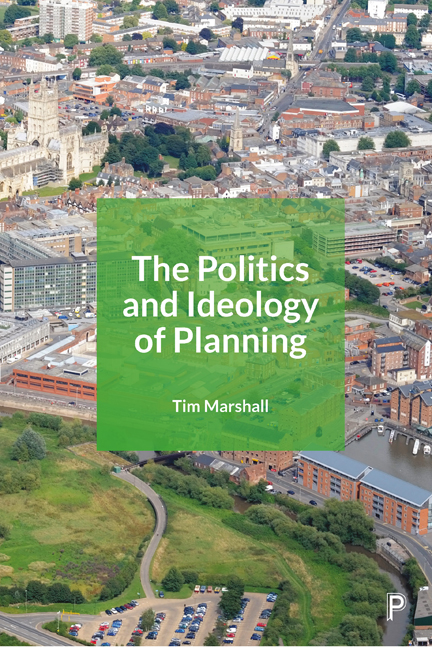Book contents
- Frontmatter
- Contents
- List of figures and tables
- List of abbreviations
- Acknowledgements
- 1 Introducing planning, politics and ideology
- 2 Writing on politics and ideology in planning
- 3 Ideologies in Britain, with initial linking to planning
- 4 Planning history, planning reform and politics and ideology
- 5 Planning expertise and planning law: autonomy from politics and ideology?
- 6 Ideology and politics in government, central and local
- 7 Ideology and politics in professions, lobbying, consultancies and pressure groups
- 8 Communication, the media and deliberation
- 9 Facets of planning action: heritage, local environment and design
- 10 Fields of planning action: housing, economy and infrastructure
- 11 Paths to improving the ideological and political dimensions of planning
- References
- Index
6 - Ideology and politics in government, central and local
Published online by Cambridge University Press: 05 January 2022
- Frontmatter
- Contents
- List of figures and tables
- List of abbreviations
- Acknowledgements
- 1 Introducing planning, politics and ideology
- 2 Writing on politics and ideology in planning
- 3 Ideologies in Britain, with initial linking to planning
- 4 Planning history, planning reform and politics and ideology
- 5 Planning expertise and planning law: autonomy from politics and ideology?
- 6 Ideology and politics in government, central and local
- 7 Ideology and politics in professions, lobbying, consultancies and pressure groups
- 8 Communication, the media and deliberation
- 9 Facets of planning action: heritage, local environment and design
- 10 Fields of planning action: housing, economy and infrastructure
- 11 Paths to improving the ideological and political dimensions of planning
- References
- Index
Summary
Chapter 1 proposed that politics could be considered in two parts, consisting of institutional and governmental forms, and of pressure and group politics. This chapter and the next explore these two (in reality intertwined) political zones. This will not, of course, exclude the treatment of ideological influences at the same time, as the governmental and pressure politics activity in planning is heavily infused with ideological dimensions.
As planning is part of the activity of the state, governmental matters are enormously important for how planning works. This chapter examines this working at central and local levels. Quite distinct governmental structures now rule the four parts of the UK, and, as elsewhere in this book, I concentrate on the UK government which rules England, directly. This is done in four sections. The first surveys the structures of government, central and local. The second explores how thinking about planning as part of public administrations or bureaucracies can reveal more about the relationship with politics. Third, I give an overview of the operation of politics and ideology in local government in England, by means of some, admittedly limited, examples. A section on neighbourhood planning follows, to see how this new area of formal planning relates to the themes of this book.
Government structures
There being no constitution, governmental structures can change significantly under the policies of any UK central government, or, within the devolved administrations, by their government decisions, within certain limits set by the devolution Acts. However, there are certain fixed points which have applied for several decades, as well as areas of change. This brief survey will identify both continuing features and some significant changes.
It can be argued that both Conservative and Labour ideologies have large components of centralism within them. In the case of Conservatism this relates to the need for strong authority at the centre of the nation (and, until the 1960s, the British Empire), especially in fields of special importance to Conservative conceptions of government, such as defence and law and order, as well as maintaining the integrity of the UK.
- Type
- Chapter
- Information
- The Politics and Ideology of Planning , pp. 101 - 130Publisher: Bristol University PressPrint publication year: 2020



